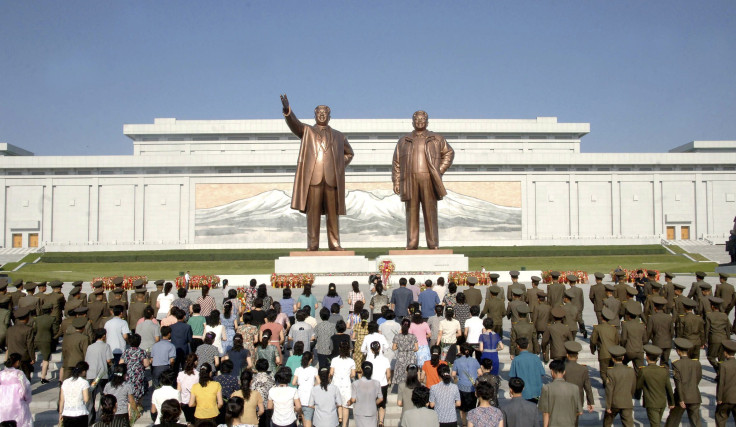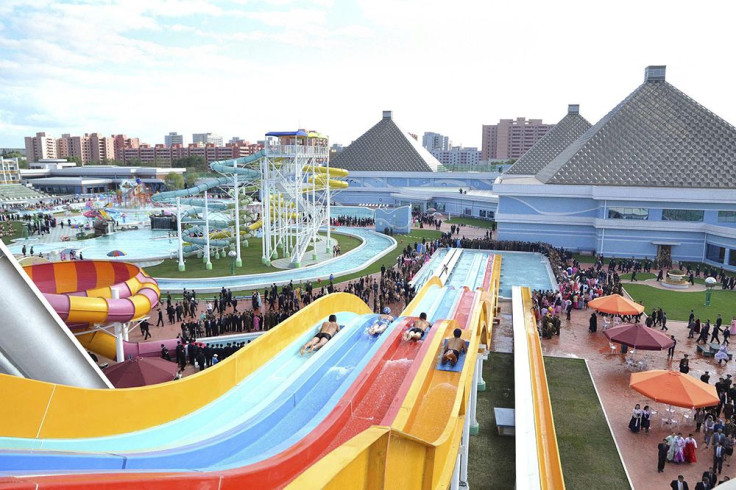North Korea's Water Park And Ski Resorts: How Tourism Could Change The Hermit Kingdom

North Korea does not have a lot going for it economically, but the country’s venture into tourism could help not only the North Korean people, but the rest of the world by gradually de-emphasizing its massive military program.

North Korea’s state-run news outlet, the Korean Central News Agency, released photos of the grand opening of Pyongyang’s latest recreational attraction, the Munsu water park. Concerns over the usefulness and even necessity of a recreational water facility -- especially in an impoverished nation with food shortages and a failed economic model -- have sparked criticism. However, the actual value of funneling North Korean state funds into large scale attractions like water parks, beach resorts and ski lodges may be underestimated.
While North Korea may not be at the top of the list for honeymooners or family reunions, there is still a surprisingly significant demand for tours into the secretive, isolated nation. Simon Cockerell, general manager of Koryo Tours, a Beijing-based company that has exclusively provided tours of North Korea to foreigners for 20 years, said the numbers of travelers interested in journeying there have grown significantly. “While numbers remains small in absolute terms [a few thousand people a year] this is [well above the figure] from just a few years ago, when several hundred people would be the norm,” Cockerell told NK News. “I would say that between 2008 and 2013 there has been an increase of something like 400 percent of the annual amount of Western tourists visiting the DPRK.”
Not only have the numbers of travelers increased, the number of tour groups operating for the very niche North Korea market has also grown. Several other tour companies from China and Sweden and other areas of Europe have also sprung up in recent years, hoping to cash in on tourism -- and the growing tourism boom is mutually beneficial.
Tourism in North Korea is a burgeoning industry that plays a significant role in the country’s cash flow. For starters, foreign tourists, who are barred from using local currency, bring in hard currency which the country is unsurprisingly lacking in, and can be used for trade or the importing of goods. The country’s tourism agency, the Korean International Tourist Company, is a government-owned initiative and provides desirable job opportunities among the country’s educated and multilingual citizens. On top of that, building up the tourist industry will undeniably provide jobs for more citizens, whether in the construction sector or in hospitality services.
Robin Tudge, writing for the Guardian, drives home the point that dollar-for-dollar, tourism is North Korea’s smartest investment. Tudge says that while developing a manufacturing industry has lots of potential for growth and sustainability, building a market foundation would depend on many things that the North doesn’t have, like regular power supplies, raw materials, up-to-date market data and international access. “For a ski resort,” Tudge says, who has visited North Korea several times, “the hill’s free, the snow’s free, it’s just up to the tourists to decide to come.”
On a global scale, maybe it’s time for the rest of the world to start encouraging the North to focus time and energy in developing its tourism industry, potentially diverting the focus of the government away from its armed forces. Tudge also noted that tourism diversifies North Korea’s limited economy to include more than just weapons, pulling those who have jobs away from bomb factories and into foreign language classes. “[Tourism] provides and demands skills ranging from designing and building quality accommodation, to the people skills required in servicing hotel guests, and brings investment in infrastructure, roads, railways, airports, health facilities and food supply chains that ever more areas will seek to benefit from as they open up to visitors.”
Cockerell also said Koryo's local tour partners have become increasingly amenable to the desires of their foreign visitors. “It’s now easier than ever to gain access to special events such as watching military parade participants on their way across the city, attending local football matches, arranging sports events between visitors and locals, visiting schools, etc.”
While tourism will likely not be the solution to North Korea’s food shortages or economic woes (nor dissuade its nuclear weapons program), seemingly inane things like a water park or an equestrian riding grounds are tangible steps toward the leadership’s slow shift in priorities.
© Copyright IBTimes 2025. All rights reserved.






















